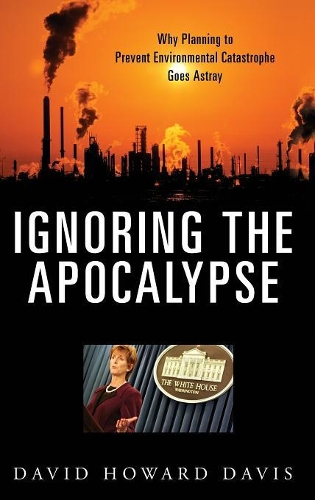
Ignoring the Apocalypse: Why Planning to Prevent Environmental Catastrophe Goes Astray
(Hardback)
Publishing Details
Ignoring the Apocalypse: Why Planning to Prevent Environmental Catastrophe Goes Astray
By (Author) David Howard Davis
Bloomsbury Publishing PLC
Praeger Publishers Inc
30th June 2007
United States
Classifications
General
Non Fiction
Politics and government
363.7
Physical Properties
Hardback
248
Width 156mm, Height 235mm
539g
Description
Environmentalists often predict an Apocalypse is coming: The earth will heat up like a greenhouse. We will run out of energy. Overpopulation will lead to starvation and war. Nuclear winter will kill all plants and animals. During the past fifty to one hundred years, Americans have heard many prophecies of doom, such as the Club of Rome report predicting the world economy would crash about the year 2020. These do not come as complete surprises without any warnings. Sometimes the United States simply ignores the threats, but other times it makes plans to prevent them. This provocative book asks whether American planning is different for dangers that are truly apocalypticones that could end life on the planet or at least modern economic prosperity. This provocative book begins by asking whether American planning is different for dangers that are truly apocalypticones that could end life on the planet or at least modern economic prosperity. It goes on to ask why Americans ignore so many problems like the greenhouse effect or an oil shortage or nuclear war, problems that have been forecast many times. Then when the United States does plan, why do those plans often go astray
Reviews
Davis has served in the US government and as a consultant on energy and environmental issues for some three decades. Picking up on America's love affair with apocalypse, inherited from the Puritans, he discusses four threats that could destroy the world as we know it: global climate change, nuclear war, over-population, and the energy crisis. * Reference & Research Book News *
Davis provides a critical assessment of how Americans go about understanding environmental catastrophes, including the formulation of plans for averting or mitigating the expected outcomes. He examines the reason why Americans often ignore impending dangers, even apocalyptic ones based on rigorous scientific and mathematical analysis, and why government solutions and policies often fail to deal realistically with their potential consequences for future generations of people and ecosystems.This is an important book to read in order to learn how people, Americans in particular, go about framing or avoiding issues that have dire consequences for the quality of human life. Recommended. Upper-division undergraduate through professional collections. * Choice *
Author Bio
David Howard Davis is Professor of Political Science at the University of Toledo. He formerly taught at the University of Wyoming, Cornell, and Rutgers. He has been an energy consultant and has served in the U.S. Department of the Interior. His experience includes stints as an analyst at the Congressional Research Service and as a faculty fellow at the General Accounting Office. Davis is the author of three previous books.
